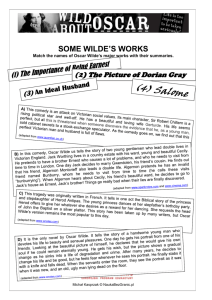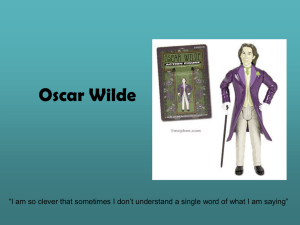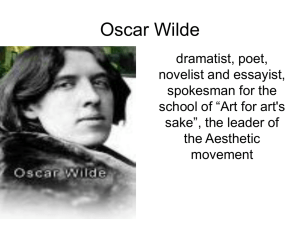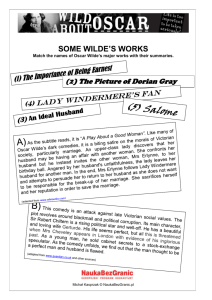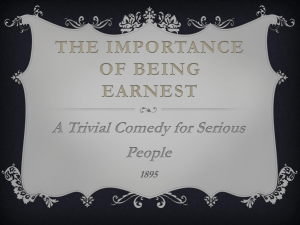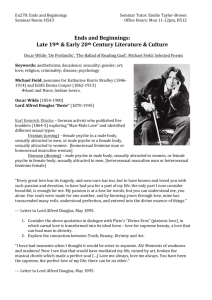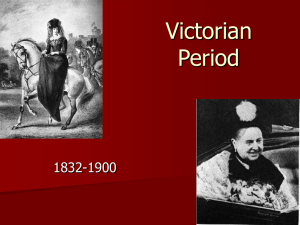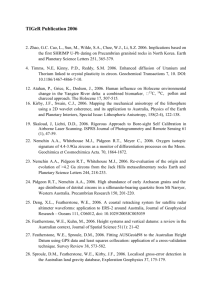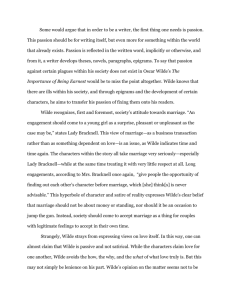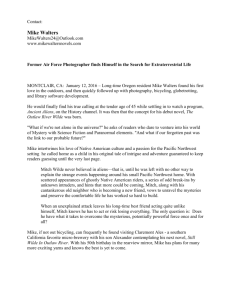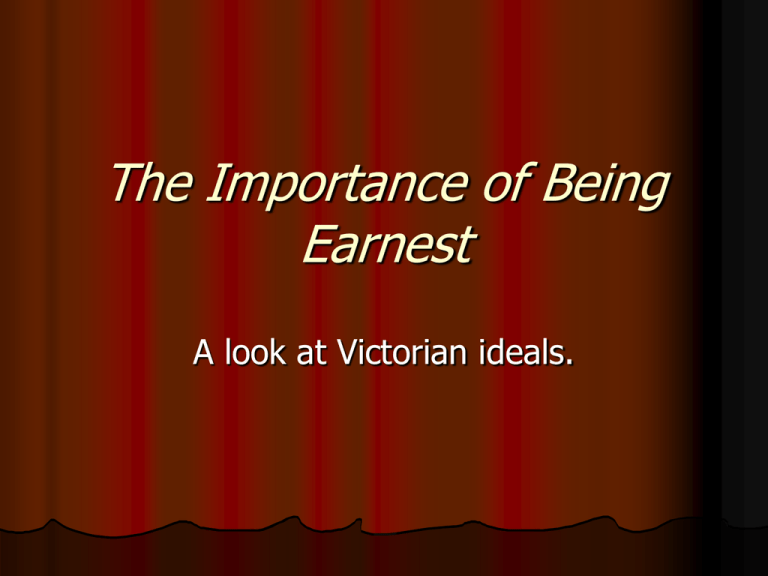
The Importance of Being
Earnest
A look at Victorian ideals.
Oscar Wilde
Born October 16, 1854 in
Dublin
Educated at Trinity
College and Oxford
Famous for flamboyant
dress, contempt of
conventional values and
belief in aestheticism
Married Constance Lloyd
in 1884
Did not hide his
homosexuality
Aestheticism
Embraced the idea of art for the sake of beauty
and beauty alone.
Characterised by the attitude of making "art for
art's sake”.
Belongs to the anti-Victorian reaction and had
post-Romantic roots.
Took place in the late Victorian period from
around 1868 to 1901, and is generally
considered to have ended with the trial of Oscar
Wilde.
Wilde’s Downfall
The end began when Wilde met Lord
Alfred Douglas (Bosie)
Had a homosexual affair from 1891 – his
death in 1900.
Was put on trial for homosexual acts.
Being gay was not a crime, the sexual act
itself was.
Trial brought by Bosie’s homophobic father
(Queensberry).
The Court Case
Bosie (protected by his powerful family) was
never charged.
Only names mentioned were those of working
class. Names of upper class were written if
necessary but never revealed.
Case allegedly was partly to redirected attention
away from Queensberry’s older brother who was
having an affair with Philip Primrose who would
later become Prime Minister.
Government punished Wilde to appease
Queensberry.
The Punishment
Wilde sentenced to two years
imprisonment in Pentonville Prison.
Spent 23 hours a day in a poorly
ventilated cell and 1 hour exercising. Had
very little human contact.
Allowed no photos, could only read The
Bible and prayer books.
Food was unspeakable, bed was wooden
boards.
The Rest of His Punishment
Left this prison 30 lbs lighter and in poor
health.
Transferred to Wandsworth Prison.
Released in May 19, 1897. Was in falirly
good health.
Immediately went to France and never
returned to England.
The Final Years
Did not write again.
Drank heavily and begged money from
friends.
Lived the rest of his life with Bosie.
Died on Nov 30th, 1900 at age 46.
Believed that he died of
meningoencephalitis complicated by
chronic middle ear infection.
Left behind two sons: Vyvyan and Cyril.
The Dandy
Introduced a new character to Victorian
melodrama - the “dandy” (a man who pays
excessive attention to his appearance).
This figure added a moral texture the form had
never before possessed.
The dandy was heavily autobiographical and
often a stand-in for Wilde himself, a witty,
overdressed, self-styled philosopher who speaks
in epigrams and paradoxes, ridicules the cant
and hypocrisy of society’s moral arbiters, and
self-deprecatingly presents himself as trivial,
shallow, and ineffectual.
Importance of Being Earnest
Part satire - human or individual vices, follies, abuses, or
shortcomings are held up to censure by means of
ridicule, derision, burlesque, irony, or other methods,
ideally with an intent to bring about improvement
Part comedy of manners - satirizes the manners and
affectations of a social class, often represented by stock
characters
Part intellectual farce - unlikely, extravagant and
improbable situations, disguise and mistaken identity,
verbal humour of varying degrees of sophistication,
which may include sexual innuendo and word play, and a
fast-paced plot whose speed usually increases.
The Victorian Era
Queen Victoria had the longest reign in British
history.
Cultural, political, economic, industrial and
scientific changes that occurred during her reign
were remarkable.
When Victoria ascended to the throne, England
was essentially agrarian and rural; upon her
death, the country was highly industrialized and
connected by an expansive railway network.
Queen Victoria
Born 1819
Became queen at 18
Reigned from 18371901
Husband’s name was
Albert. He died in
1861 and she
mourned him for the
rest of her life.
Victorian Prudery
It was improper to say "leg" in mixed company;
instead, the preferred euphemism “limb” was
used.
Verbal or written communication of emotion or
sexual feelings was not acceptable so people
instead used the language of flowers or food.
Alleged that tableclothes and bedskirts were
created to cover “legs” of tables and beds.
More likely they were created to cover the
shabbiness of the furniture.
Repression
Characterised by
sexual repression.
Men's clothing is
formal and stiff,
women's is fussy and
over-done.
Ankles are scandalous


